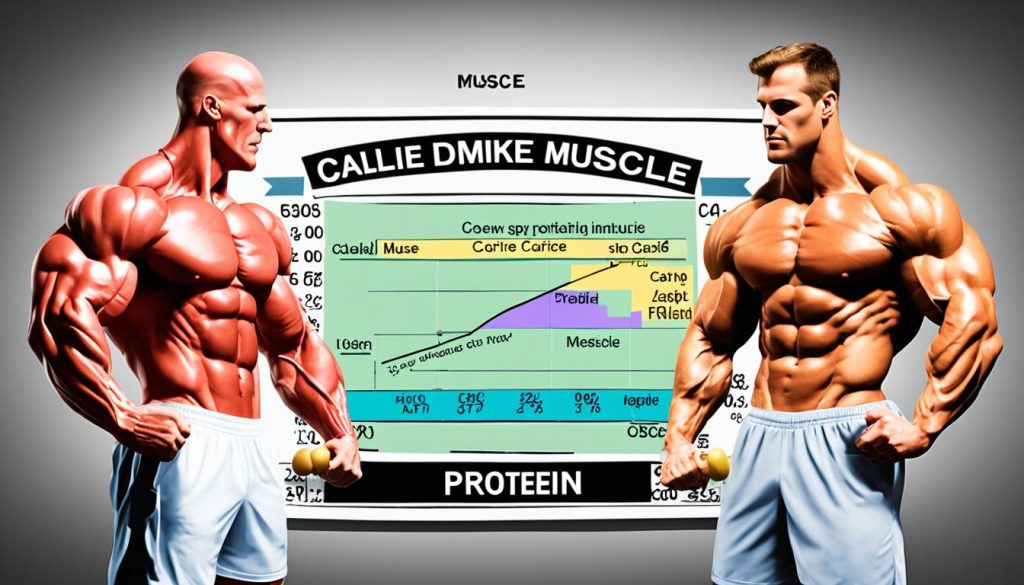Ad Blocker Detected
Our website is made possible by displaying online advertisements to our visitors. Please consider supporting us by disabling your ad blocker.
Welcome to our article on maximizing muscle protein synthesis! If you’re looking to build muscle, promote muscle growth, and enhance muscle repair, understanding the process of muscle protein synthesis is essential. By optimizing this anabolic process, you can unlock your body’s full potential for muscle building and achieve your fitness goals.
Key Takeaways:
- Maximizing muscle protein synthesis is crucial for muscle growth and repair.
- Strength training is a key component in increasing muscle protein synthesis.
- Protein intake, distribution, and timing play a significant role in optimizing muscle protein synthesis.
- Consuming protein before and after workouts can enhance the anabolic response and reduce muscle protein breakdown.
- BCAAs, particularly leucine, stimulate muscle protein synthesis and prevent muscle protein breakdown.
The Importance of Strength Training
When it comes to optimizing muscle protein synthesis, strength training is a key component of your fitness routine. By engaging in strength training exercises, you not only challenge your muscles but also stimulate the process of muscle fiber damage and repair. This process plays a vital role in increasing protein synthesis levels and promoting muscle growth.
During strength training, the heavy weights you lift create microscopic tears in your muscle fibers. In response to this damage, your body initiates protein synthesis to rebuild and strengthen the muscle tissue. This repair process is essential for hypertrophy (muscle growth) and adaptation to the physical demands placed on your muscles.
Over time, however, your body becomes more efficient at recovering from this damage. This means that the same workout routine may no longer provide the same stimulus for muscle protein synthesis. To continue maximizing protein synthesis levels, it is crucial to progressively increase the intensity and load of your strength training exercises.
So, how can you optimize your strength training for muscle protein synthesis? Here are a few tips:
- Focus on compound exercises that target multiple muscle groups, such as squats, deadlifts, and bench presses. These exercises elicit a greater hormonal response and stimulate higher protein synthesis levels.
- Implement progressive overload by gradually increasing the weight, repetitions, or sets of your exercises over time. This ensures that your muscles are continually challenged and protein synthesis levels remain high.
- Allow for adequate rest and recovery between strength training sessions. This gives your muscles time to repair and adapt, leading to increased protein synthesis and muscle growth.
Remember, strength training is not just about lifting heavy weights. It’s about strategically placing stress on your muscles to trigger muscle fiber damage and subsequent repair. By following a well-designed strength training program and progressively challenging your muscles, you can optimize protein synthesis levels and achieve your muscle-building goals.
Expert Insight: Dr. Rebecca Smith
“Strength training provides a powerful stimulus for muscle protein synthesis. By progressively increasing the demands on your muscles, you can continually stimulate protein synthesis, leading to enhanced muscle growth and strength gains.”

Protein Intake for Muscle Protein Synthesis
To optimize muscle protein synthesis and support your fitness goals, it is crucial to consume an adequate amount of protein. Aim to consume around 0.8 to 1.2 grams of protein per pound of body weight per day. This protein intake provides the necessary building blocks for muscle growth and repair.
While total protein intake is important, the distribution and timing of protein consumption also play a significant role in maximizing muscle protein synthesis. Research suggests that distributing protein intake across several meals throughout the day can be highly beneficial.
It is recommended to consume 20 to 40 grams of protein per meal to stimulate protein synthesis and reduce breakdown. By evenly distributing your protein intake throughout the day, you provide your muscles with a steady supply of amino acids, promoting optimal muscle protein synthesis.
| Meal | Protein Intake (grams) |
|---|---|
| Breakfast | 25 |
| Snack | 20 |
| Lunch | 30 |
| Pre-Workout | 20 |
| Post-Workout | 40 |
| Dinner | 30 |
| Evening Snack | 25 |
By following a protein intake plan like the one above, you ensure that your muscles are constantly supplied with the essential amino acids needed for muscle growth and repair. Remember that consistency in protein intake and timing is key to maximize muscle protein synthesis.
Next, we will explore the impact of protein timing on muscle protein synthesis and recovery.
The Timing of Protein Consumption
When it comes to optimizing muscle protein synthesis, the timing of your protein consumption is crucial. By strategically consuming protein before and/or after your workout, you can enhance the anabolic response and reduce muscle protein breakdown.
Research suggests that consuming protein within a window of opportunity, typically within three hours of your workout, is the most effective approach. This allows amino acids to be readily available for muscle repair and growth during the peak period of protein synthesis.
To ensure that you maximize the benefits of protein timing, consider the following:
Aim for Pre- and Post-Workout Protein
Consuming protein both before and after your workout can help trigger muscle protein synthesis and support muscle recovery. Pre-workout protein primes your muscles for growth, while post-workout protein provides the essential nutrients needed to repair and rebuild muscle tissue.
Strategize Your Protein Intake
Dividing your protein intake across multiple meals throughout the day can optimize muscle protein synthesis. Research suggests that consuming 20 to 40 grams of protein per meal stimulates protein synthesis and minimizes muscle breakdown.
Choose High-Quality Protein Sources
When timing your protein consumption, it’s essential to choose high-quality protein sources that contain all the essential amino acids your muscles need for growth and repair. Lean meats, poultry, fish, eggs, dairy, and plant-based protein sources are excellent options.
Supplement Wisely
If needed, consider supplementing with protein powders or amino acid supplements to meet your protein needs. Whey protein, in particular, is a popular choice due to its high leucine content, which is known to stimulate muscle protein synthesis.
By paying attention to the timing of your protein consumption, you can effectively support muscle protein synthesis, promote muscle growth, and achieve your fitness goals.

The Role of BCAAs
Branched-chain amino acids (BCAAs), particularly leucine, play a vital role in muscle growth and preventing muscle protein breakdown. BCAAs are essential amino acids that cannot be produced by the body and must be obtained from dietary sources. They are known to stimulate muscle protein synthesis, promote muscle repair, and support recovery after intense workouts.
Consuming BCAAs, either through supplementation or as part of a protein-rich diet, can offer significant benefits for those looking to maximize their muscle growth potential. BCAAs provide your muscles with the necessary building blocks to support protein synthesis, which is crucial for muscle repair and growth.
“BCAAs are essential for muscle growth and repair. By incorporating BCAAs into your fitness routine, you can accelerate muscle recovery and optimize muscle protein synthesis.”
A key component of BCAAs is leucine, which has been extensively studied for its anabolic properties. Leucine acts as a trigger for muscle protein synthesis, activating the signaling pathways that stimulate growth and repair. By ensuring an adequate intake of leucine-rich foods or BCAA supplements, you can enhance muscle protein synthesis and prevent muscle breakdown.
One of the most effective sources of BCAAs is whey protein. Whey protein contains a high concentration of BCAAs, making it an ideal choice for individuals looking to support muscle growth and recovery. Consuming whey protein before and after exercise can provide your muscles with the necessary amino acids to maximize the benefits of BCAAs.

Including BCAAs in your fitness regimen can be a game-changer for achieving your muscle growth goals. Whether it’s through BCAA supplementation or incorporating BCAA-rich foods into your diet, prioritize BCAAs to optimize muscle protein synthesis, prevent muscle breakdown, and enhance your overall results.
Calories and Muscle Protein Synthesis
Adequate calorie intake is essential for optimizing muscle protein synthesis and promoting muscle growth. When you consume fewer calories than your body needs, also known as a calorie deficit, your body may prioritize energy conservation over muscle growth. To prevent this, it’s crucial to ensure that you consume enough calories to maintain or increase your body weight.
Aiming for approximately 14 to 16 calories per pound of body weight can provide your body with the energy it needs to support muscle protein synthesis and muscle growth. By providing your body with an adequate calorie intake, you create a favorable environment for the anabolic process that fuels muscle building.
Remember, every body is unique, so it’s important to understand your individual calorie needs based on factors such as your activity level, metabolism, and goals. Consulting with a registered dietitian or nutritionist can help you determine the right calorie intake for your specific needs and optimize your muscle protein synthesis.

In addition to calorie intake, it’s essential to focus on consuming high-quality protein sources to support muscle protein synthesis. Combining a well-balanced diet with regular strength training exercises can further enhance muscle growth and optimize your fitness journey.
Calorie Intake and Muscle Growth – A Comparative Analysis
| Calorie Intake | Muscle Growth |
|---|---|
| Calorie Deficit | May hinder muscle growth due to the body prioritizing energy conservation over protein synthesis. |
| Adequate Calorie Intake | Optimizes protein synthesis and creates an anabolic environment, supporting muscle growth. |
| Calorie Surplus | May lead to excess weight gain, including both muscle and fat. |
As you can see from the comparative analysis above, consuming an adequate amount of calories is crucial for maximizing muscle growth. When combined with proper strength training and a balanced diet, the right calorie intake empowers your body to support muscle protein synthesis and achieve your fitness goals.
The Importance of Sleep
Sleep is a crucial factor in optimizing muscle protein synthesis, supporting muscle growth, and facilitating recovery. When you sleep, your body goes through important processes that promote muscle repair and regeneration. During this time, the body releases hormones that are critical for muscle protein synthesis, which is the process of building new muscle proteins.
Insufficient sleep can hinder the recovery process and negatively impact muscle growth. It can disrupt hormone production and protein turnover, leading to decreased muscle protein synthesis. Additionally, lack of sleep can increase the production of stress hormones, which can further impede muscle recovery.
To optimize muscle protein synthesis and support overall muscle health, aim for 7 to 8 hours of quality sleep per night. Establish a regular sleep schedule, create a relaxing bedtime routine, and create a sleep-friendly environment. These practices can help ensure that you get enough sleep and facilitate optimal muscle recovery and growth.

The Impact of Sleep on Muscle Protein Synthesis
“Sleep plays a crucial role in muscle recovery and protein synthesis. During deep sleep, the body releases growth hormone, which stimulates muscle repair and growth.”
Tips for Better Sleep
- Create a bedtime routine that includes relaxing activities such as reading, taking a warm bath, or practicing meditation.
- Avoid electronics, caffeine, and stimulating activities before bed.
- Create a sleep-friendly environment by keeping your bedroom dark, cool, and quiet.
- Avoid large meals close to bedtime, but a light protein-rich snack can be beneficial for muscle repair during sleep.
- Exercise regularly, but avoid intense workouts close to bedtime as they may interfere with sleep.
Exercise Guidelines for Muscle Protein Synthesis
Regular exercise is vital for optimizing muscle protein synthesis and achieving your fitness goals. By incorporating effective strength training exercises into your routine, you can stimulate muscle growth and enhance protein synthesis. Here are some exercise guidelines to maximize muscle protein synthesis:
Aim for an Appropriate Number of Sets and Reps
When performing strength training exercises, it’s important to find the right balance between the number of sets and reps. Aim for a moderate to high volume of work, ensuring that you challenge your muscles without overexertion. This helps to stimulate muscle protein synthesis and promote muscle growth.
Progressively Increase Intensity and Load
To continually stimulate muscle protein synthesis, it’s essential to progressively increase the intensity and load of your exercises over time. This can be achieved by gradually lifting heavier weights or increasing the resistance levels of your workout equipment. By challenging your muscles with progressively higher demands, you can promote ongoing protein synthesis and muscle adaptation.
Pay Attention to Training Frequency
Training frequency plays a crucial role in optimizing muscle protein synthesis. While it’s important to train consistently, allowing sufficient rest between workouts is equally crucial. This rest period allows for muscle recovery, repair, and protein synthesis. Find a training frequency that suits your individual needs and goals, ensuring that you strike a balance between workout intensity and recovery time.
Listen to Your Body
It’s important to listen to your body and adjust your exercise routine accordingly. If you experience excessive fatigue, soreness, or lack of progress, it may be a sign that you need to modify your training volume or intensity. Striking the right balance between challenging your muscles and providing adequate recovery time is key to optimizing muscle protein synthesis.
“Consistency is key when it comes to exercise and muscle protein synthesis. By following a well-designed strength training program and incorporating these guidelines, you can effectively stimulate muscle growth and enhance protein synthesis.”
| Exercise Guideline | Key Points |
|---|---|
| Aim for an Appropriate Number of Sets and Reps | Moderate to high volume of work |
| Progressively Increase Intensity and Load | Gradually lift heavier weights or increase resistance |
| Pay Attention to Training Frequency | Balance between workout intensity and rest |
| Listen to Your Body | Modify routine based on fatigue, soreness, and progress |

Nutrition Guidelines for Muscle Protein Synthesis
Nutrition plays a crucial role in optimizing muscle protein synthesis. To support your muscle growth and repair, it’s important to focus on consuming an adequate amount of protein from high-quality sources. Include lean meats, poultry, fish, eggs, dairy products, and plant-based protein sources in your diet to ensure you’re getting the necessary amino acids for muscle protein synthesis.
In addition to choosing the right protein sources, pay attention to the timing of your protein consumption. This is especially important around your workouts, as it ensures that amino acids are readily available for muscle repair and growth. Consider consuming a protein-rich meal or snack within an hour before and after your training sessions to maximize muscle protein synthesis.
While protein is essential, don’t forget about the importance of overall energy balance. Incorporating carbohydrates or healthy fats alongside protein can provide the necessary fuel for your workouts and support muscle protein synthesis. Strive to maintain a balanced diet that includes a variety of nutrient-dense foods to optimize your nutrition for muscle growth and performance.
FAQ
What is muscle protein synthesis?
Muscle protein synthesis is the process of building new muscle proteins, which is essential for muscle growth and repair.
How can I maximize muscle protein synthesis?
To maximize muscle protein synthesis, incorporate strength training exercises into your routine, consume an adequate amount of protein, pay attention to the timing of protein consumption, and ensure you get enough sleep.
Why is strength training important for muscle protein synthesis?
Strength training causes muscle fiber damage, which triggers the body to increase protein synthesis to repair and rebuild the muscle tissue. Increasing the intensity and load of your strength training over time is necessary to maintain high protein synthesis levels.
How much protein should I consume for optimal muscle protein synthesis?
Aim to consume around 0.8 to 1.2 grams of protein per pound of body weight per day.
Does the distribution and timing of protein intake matter?
Yes, distributing protein intake across several meals throughout the day and consuming 20 to 40 grams of protein per meal can stimulate protein synthesis and reduce breakdown.
When should I consume protein to enhance muscle protein synthesis?
Consuming protein before and/or after your workout, within three hours of your workout, can enhance the anabolic response and reduce muscle protein breakdown.
Are BCAAs beneficial for muscle protein synthesis?
Yes, branched-chain amino acids (BCAAs), particularly leucine, stimulate muscle protein synthesis and prevent muscle protein breakdown. Consuming BCAAs, either through supplementation or as part of a protein-rich diet, can support muscle growth and recovery.
Does calorie intake affect muscle protein synthesis?
Yes, adequate calorie intake is essential for optimizing muscle protein synthesis and promoting muscle growth. Consuming enough calories to maintain or increase your body weight is important.
How does sleep impact muscle protein synthesis?
Sleep is vital for muscle protein synthesis and recovery. During sleep, the body releases hormones critical for muscle protein synthesis. Aim for 7 to 8 hours of quality sleep per night.
What guidelines should I follow for exercise and muscle protein synthesis?
Incorporate strength training exercises into your routine. Aim for an appropriate number of sets and reps per exercise, progressively increase intensity and load over time, and allow sufficient rest between workouts for muscle recovery and protein synthesis.
What nutrition guidelines are important for muscle protein synthesis?
Consume an adequate amount of protein from high-quality sources, pay attention to the timing of protein consumption (especially around workouts), and consider incorporating carbohydrates or fats alongside protein to support muscle protein synthesis and energy balance.
How Can Protein Supplements Help Maximize Muscle Protein Synthesis?
When it comes to maximizing muscle protein synthesis, choosing the best protein supplements is crucial. These supplements provide the necessary amino acids to support muscle growth and repair. By consuming high-quality protein supplements, individuals can ensure that their muscles have the fuel they need to reach their full potential.


